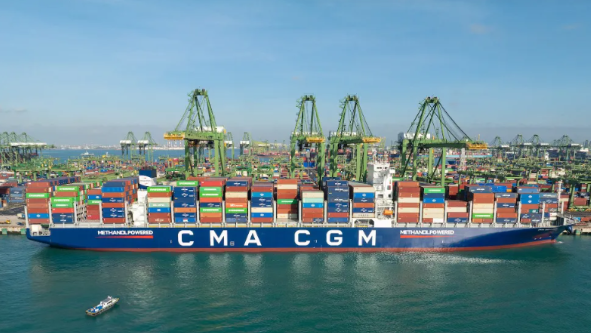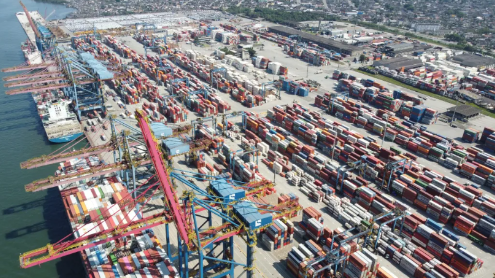Recent industry data shows a noticeable increase in blank sailings, as shipping lines cut capacity on major trade routes to adjust to declining demand.
The trade conflict has triggered a strong market reaction, particularly visible on the Asia–North America East Coast route.
According to Sea-Intelligence's latest analysis, the most affected period was the week starting May 5, when blank capacity reached 42% of the total offered capacity, a sharp 7-percentage-point increase from the previous week. The Asia–North America West Coast route also experienced notable disruption, with blank capacity rising from 13% to over 28% during the week starting April 28.
Drewry’s latest report shows that between Week 18 and Week 22, a total of 75 sailings were canceled across the main east-west trade lanes, representing 10% of total scheduled sailings. Of these, approximately 61% were on eastbound trans-Pacific routes, 31% on Asia–North Europe and Mediterranean routes, and 8% on westbound transatlantic routes.
While reliability is expected to improve modestly, with Drewry forecasting that 90% of weekly sailings will proceed as scheduled, the situation remains unstable.
The impact on freight rates is already visible. Drewry’s WCI composite index fell by 2% week-over-week, reaching $2,157 per forty-foot container. The largest drop occurred on Pacific routes at 3%, while Asia–Europe/ Mediterranean and transatlantic routes declined by 1% each.
In response, carriers have announced Peak Season Surcharges (PSS) starting next month, possibly to address front-loading driven by tariff concerns.
CMA CGM will impose a PSS of $600 per TEU and $900 per FEU for shipments to Mexico and Canada starting May 15, and for shipments to the U.S. starting May 25. Additionally, shipments from North Europe to North America will face a PSS of $400 per TEU and $800 per FEU starting May 15.
Whether these price increases can be sustained will be an important indicator of demand trends over the next four weeks.
Industry stakeholders are adopting a cautious approach, with some exploring alternative sourcing options in Southeast Asia. However, equipment shortages and capacity constraints continue to pose significant challenges.
Looking ahead, market stability largely depends on the outcome of tariff negotiations; prolonged uncertainty could lead to further service reductions.

Last
CMA CGM s CEVA Logistics to Acquire Turkey s Borusan Logistics Unit for $440 Million
CEVA Corporate Services, a subsidiary of French shipping giant CMA CGM, has signed an agreement to acquire BRYAT, a unit of Turkis

Next
CMA CGM Becomes Controlling Shareholder of Santos Brasil After Completing $2 Billion Acquisition
CMA CGM Group recently announced that, after obtaining regulatory approval from Brazilian authorities, it has completed the acquis



